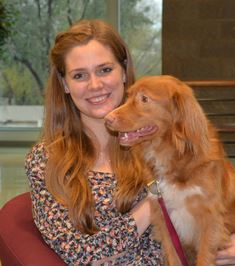Ms. Emily Brown

The Nova Scotia Duck Tolling Retriever Club of America, with matching funds from the U.C. Davis Center for Companion Animal Health (CCAH) is funding Emily Brown, a combined DVM/PhD student in the laboratory of Dr. Danika Bannasch, to conduct research investigating the genetic etiology of Addison’s disease in the Nova Scotia Duck Tolling Retriever (NSDTR). Addison’s disease is an endocrine disorder resulting from lack of hormone production by the adrenal gland and can occur in a dog of any breed at any age. Although relatively uncommon in the general dog population, certain breeds including the Nova Scotia Duck Tolling Retriever have been found to have a genetic predisposition. Previous research on Addison’s disease in the NSDTR has shown a wide distribution of age at Addison’s disease onset, suggesting 2 main categories of Addison’s disease in the breed: a juvenile-onset form occurring in dogs under 12 months of age and an adult-onset form occurring on average at 4.6 years of age. An associated locus has been identified for the juvenile-onset form of the disease using genome-wide association analysis; however, no locus has been identified as associated with the adult-onset form of the disease in the breed.
Fellowship Research Project
Over the course of her PhD, Ms. Brown hopes to elucidate the genetic cause of adult-onset Addison’s disease in the breed, providing both tools for clinicians in diagnosis and for breeders in producing healthier dogs.
Ms. Brown is a previous recipient of a veterinary student travel grant from the Orthopedic Foundation for Animals and attended the AKC Canine Health Foundation National Parent Club Canine Health Conference in St. Louis, Missouri. Through attending this meeting, she was able to interact with breeders and other veterinary scientists united in the goal of improving purebred canine health. Attendance at this meeting motivated Brown to focus her PhD on genetic health issues affecting purebred dogs. Upon completion of her DVM/PhD degrees, Brown plans to pursue a residency in theriogenology and eventually an academic position at a veterinary school. She hopes that through her combined knowledge of veterinary medicine and genetics that she will be able to assist breeders in improving canine health, as well as be an active participant in the translation of basic science research to veterinary medicine.
Ms. Brown's research is proudly supported by the Nova Scotia Duck Tolling Retriever Club (USA) and the UC Davis Center for Companion Animal Health.
Learn more about the AKC Canine Health Foundation Clinician-Scientist Fellowship Program and Adopt a Researcher.
Help Future Generations of Dogs
Participate in canine health research by providing samples or by enrolling in a clinical trial. Samples are needed from healthy dogs and dogs affected by specific diseases.



